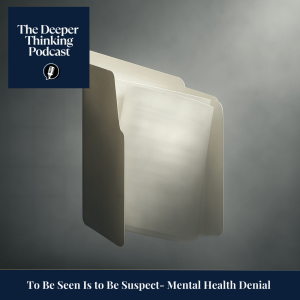
Wednesday Apr 16, 2025
To Be Seen Is to Be Suspect - Mental Health Denial - The Deeper Thinking Podcast
To Be Seen Is to Be Suspect
A meditation on diagnosis, distress, and the politics of visibility.
What happens when care becomes a performance, and diagnosis the only form of public belief? This episode explores how mental health recognition is tethered to systems that demand collapse before offering aid. It asks what’s at stake when distress must be translated into medical language just to be acknowledged—and what gets lost when structural grief is mislabeled as clinical excess.
The notion of “overdiagnosis” seems, at first, like a caution against excess. But in a world where suffering is often unseen unless it is named in clinical terms, the real issue may not be inflation—but compression. As Susan McPherson and Lauren Berlant suggest, what we frame as psychiatric surplus may instead be the slow surfacing of deferred, systemic pain. And Judith Butler’s concept of grievability reminds us that some lives—and some pains—are never granted the same access to recognition.
The question, then, is not whether we name too much—but why naming is required at all. Drawing from Frantz Fanon’s insight into translation under power, and Achille Mbembe’s theory of necropolitics, we examine how welfare systems discipline visibility and control affective legitimacy. This episode does not reject diagnosis—it reframes it. Not as falsehood, but as a narrow vessel overflowing with meanings it was never built to hold.
Reflections
Some of the questions that surfaced along the way:
- Why must pain be pathologised before it is believed?
- What happens when diagnosis becomes a form of access?
- Can suffering exist without a medical translation?
- Who decides which grief is visible and which is dismissed?
- What if “overdiagnosis” is not an excess—but a backlog?
- How do systems of care convert witnessing into suspicion?
- Is it possible to hold suffering without naming it?
Why Listen?
- Explore the ethical politics of diagnosis and visibility
- Reframe overdiagnosis through structural and philosophical critique
- Engage thinkers who challenge the logic of psychiatric containment
- Reflect on recognition, care, and the power of naming
Listen On:
Support This Work
If you'd like to support the ongoing work, you can visit buymeacoffee.com/thedeeperthinkingpodcast or leave a kind review on Apple Podcasts.
Bibliography
- Ahmed, Sara. Living a Feminist Life. Durham: Duke University Press, 2017.
- Berlant, Lauren. Cruel Optimism. Durham: Duke University Press, 2011.
- Butler, Judith. Precarious Life. London: Verso, 2004.
- Fanon, Frantz. Black Skin, White Masks. New York: Grove Press, 2008.
- Mbembe, Achille. Necropolitics. Durham: Duke University Press, 2019.
- McPherson, Susan. “Challenging the ‘Disorder’ in Mental Health.” Journal of Mental Health, vol. 28, no. 1 (2019): 1–3.
- Federici, Silvia. Re-enchanting the World. Oakland: PM Press, 2018.
- Foucault, Michel. The Birth of the Clinic. New York: Vintage, 1994.
- Kittay, Eva Feder. Love’s Labor. New York: Routledge, 1999.
- Honneth, Axel. The Struggle for Recognition. Cambridge: MIT Press, 1995.
- Spivak, Gayatri Chakravorty. “Can the Subaltern Speak?” In Marxism and the Interpretation of Culture, University of Illinois Press, 1988.
- Rancière, Jacques. The Politics of Aesthetics. London: Bloomsbury, 2013.
- Sharpe, Christina. In the Wake. Durham: Duke University Press, 2016.
- Anzaldúa, Gloria. Borderlands/La Frontera. San Francisco: Aunt Lute, 1987.
- Bloch, Ernst. The Principle of Hope. Cambridge: MIT Press, 1995.
- Lugones, María. Pilgrimages/Peregrinajes. Lanham: Rowman & Littlefield, 2003.
To be named is not always to be known. And to be seen is not always to be safe.
#MentalHealth #Overdiagnosis #JudithButler #LaurenBerlant #SusanMcPherson #FrantzFanon #AchilleMbembe #Recognition #Visibility #StructuralGrief #TheDeeperThinkingPodcast #Suffering #PoliticsOfCare #AffectTheory
No comments yet. Be the first to say something!